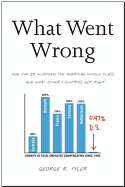
Several books have examined the effects of the recent recession, but few have dug as deeply into the root causes of country's current economic malaise as George R. Tyler's What Went Wrong. Tyler--a deputy Treasury secretary in the Clinton administration and former World Bank counselor--brings his experience to bear on what he sees as the culprit behind today's stagnating wages and increasing wealth gaps: the economic policies of the Reagan administration and the "shareholder capitalism" that emphasizes short-term gains that look good on quarterly reports over long-term growth that sustains a viable standard of living for workers while keeping pace with productivity and inflation.
Tyler's critique of Reaganomics and its "trickle-down" approach challenges several common economic myths. He argues, for instance, that Adam Smith supported rigorous government regulation of corporations as a means of maintaining competition in a capitalist economy. He also observes that von Hayek and Keynes--whose theories are assumed to conflict--actually align against the Reaganomics strategy of, as he describes it, "overtly crafting large, routine structural deficits merely to lower taxes on the wealthy." Finally, he states that there is no real relation between the minimum wage and unemployment or inflation, and thus no reason for corporations to continue suppressing wages--except that they can.
Though his conclusions are undoubtedly controversial, Tyler grounds his arguments in data and facts, providing a deep exploration of our current economic situation and the pre-Reagan policies that, if implemented again, may lead us out. --Dani Alexis Ryskamp, blogger at The Book Cricket

